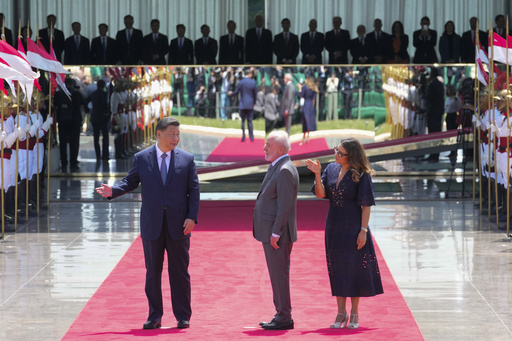
RIO DE JANEIRO — On Wednesday, Brazilian President Luiz Inácio Lula da Silva officially hosted China’s President Xi Jinping during a state visit at the Alvorada Palace in Brasilia. This marks a significant step in the ongoing strengthening of relations between Brazil and China, particularly in anticipation of Donald Trump potentially returning to the U.S. presidency in 2025.
Since surpassing the United States as Brazil’s primary export market in 2009, the relationship between the two nations has flourished in both trade and investment. During the visit, Lula and Xi formalized this growing partnership by signing 37 agreements covering a diverse range of areas including trade, tourism, agriculture, industry, science and technology, health, energy, culture, and education.
Analysts indicate that this development aligns with a broader trend in Latin America. Recently, Xi inaugurated a $1.3 billion megaport in Peru, signaling a shift in the region’s alliances. “Latin America has often been overlooked by the U.S. and the EU. Who steps in to bridge this gap? China,” explained Flavia Loss, a sociology and politics professor at the Foundation School of Sociology and Politics in Sao Paulo. Additionally, she noted that Trump’s potential election is already contributing to this increasing closeness, evident in current events.
Xi’s visit takes place over a year after Lula traveled to China to bolster Brazil’s ties and mend relations with its largest trading partner following a fraught period under former president Jair Bolsonaro. Bolsonaro’s administration had seen tensions arise, including accusations from his son Eduardo, who attributed the COVID-19 pandemic to the Chinese Communist Party and labeled the technology company Huawei as involved in espionage. Not surprisingly, China had no ambassador in Brazil for an extended period during 2022.
Lula’s administration, in contrast, aims to repair relations with China as part of a broader strategy to reintegrate Brazil into international conversations after a period of isolationism. In comments to the press, Lula emphasized that the collaborative efforts of China and Brazil have global implications, particularly in the context of their roles in the UN and BRICS, a coalition of developing nations.
Xi characterized the bond between China and Brazil as one of “reliable friends with a shared destiny,” highlighting their roles as positive forces for promoting peace. According to Brazil’s presidential office, between January and October 2024, bilateral trade totaled an impressive $136.3 billion. Eduardo Saboia, who serves as secretary for Asia and the Pacific in Brazil’s foreign affairs ministry, mentioned that since 2004, when Lula first visited China, bilateral trade has increased over 17-fold, with exports to China exceeding the combined total to the U.S. and EU.
China has been advocating for Brazil to join its Belt and Road Initiative (BRI), designed to expand global infrastructure through investments from Chinese firms. Although Brazil has been initially reluctant, discussions are ongoing, focusing on potential partnerships to mitigate climate change and financing adaptation measures. Pedro Brites, an expert at the Getulio Vargas Foundation, remarked that while Brazil has managed to achieve solid agreements with China without formally joining the BRI, the definitive benefits of such a move are still being weighed.
While Trump’s potential return to the presidency might foster even closer ties between Brazil and China, there are concerns that aligning too closely with China could complicate Brazil’s relationships with Washington and Europe. Brites highlighted that Brazil will strive to maintain its beneficial interactions with China but cautioned there would likely be limits to this approach.
